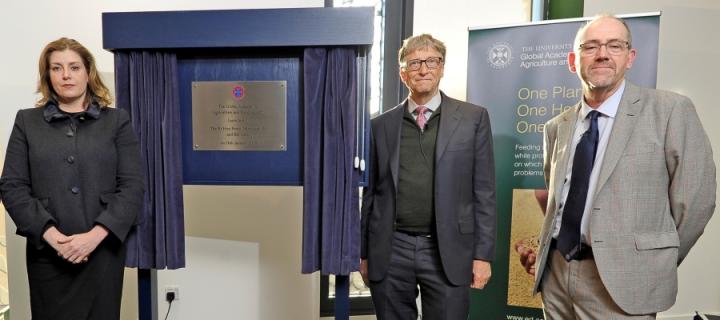Launch of the Global Academy of Agriculture and Food Security
Bill Gates and Government Minister Penny Mordaunt have formally launched the Global Academy of Agriculture and Food Security, a £35 million research and teaching initiative focused on safeguarding the future of the world’s food supplies, during a visit to the University’s Easter Bush campus.

Food security
The Global Academy for Agriculture and Food Security is a hub for teaching and research into issues that affect global food and environmental security, sustainable rural development, and the wellbeing of animals and people.
In addition to world-class research, the Academy will offer undergraduate and postgraduate training, educational activities and resources to equip future leaders with the skills and knowledge required to tackle these challenges.
New courses
New undergraduate courses in agricultural sciences, developed jointly with Scotland’s Rural College (SRUC), will prepare students to respond to the global challenges associated with sustainable farming in the face of a changing climate.
Celebrating UK innovations in agriculture
Bill Gates and Government Minister Penny Mordaunt visited the University’s Easter Bush campus to showcase how communities worldwide are being helped by innovative agricultural research.
The co-chair of the Bill & Melinda Gates Foundation and the UK International Development Secretary discussed how their organisations invest in projects based in Edinburgh which are improving the health and productivity of people and farm animals at home and abroad.
Improving lives
During their visit, they took part in a discussion event with staff and students to highlight how UK innovations are improving the prosperity of farmers in developing countries.
For over a billion people living in the world’s poorest countries, agriculture and livestock are a lifeline out of poverty. The science and research being led by the great minds here in Edinburgh are making huge strides in improving the health and productivity of livestock.
New funding
In her speech, the Secretary of State unveiled a package of investments in research to improve the resilience of farmers’ crops and livestock to natural disasters and protect them from diseases. This included £4m for the Centre for Tropical Livestock Genetics and Health, which is based in the University’s Roslin Institute at the Royal (Dick) School of Veterinary studies.
This transformative UK aid research will not only stop diseases from destroying the livelihoods of African farmers, it will also help control livestock diseases on British farms.
Bill Gates announced $40m funding for the Edinburgh-based charity the Global Alliance for Livestock Veterinary Medicines (GALVmed), which works to improve the accessibility and affordability of livestock vaccines, medicines and diagnostics in developing countries.
Livestock research
Animal agriculture is a reliable source of food for people living in extreme poverty and is also an economic driver that creates opportunities for poor farmers to build a brighter future for their families.
Rearing livestock in developing countries is challenging. Diseases pose serious risks to animal welfare and human health and can reduce farmers’ income. Often farmers are reliant on poor quality feed and fodder, suboptimal veterinary care and inadequate breeding systems.
Genetic studies
The Centre for Tropical Livestock Genetics and Health aims to build on the gains that have been made in UK farming from cutting edge animal genetics and selective breeding to sustainably improve livestock productivity and resilience in developing countries.
The Centre is a partnership between The Roslin Institute, Scotland’s Rural College and the International Livestock Research Institute based in Kenya and Ethiopia.
Data sharing
Also taking part in the event, experts from the Supporting Evidence Based Interventions project highlighted how developments in data-sharing and accessibility can help inform better livestock decision making.

